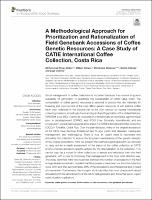A Methodological Approach for Prioritization and Rationalization of Field Genebank Accessions of Coffee Genetic Resources: A Case Study of CATIE International Coffee Collection, Costa Rica
Fecha de publicación
12-2021Autor
Dulloo, Mohammad Ehsan
Solano Sánchez, William
Dessauw, Dominique
Astorga, Carlos
Guarino, Luigi
Objetivos de desarrollo sostenible
ODS 15 - Vida de ecosistemas terrestres
Tipo
Artículo
Metadatos
Mostrar el registro completo del ítemResumen
Good management of coffee collections is important because they ensure long-term availability of germplasm to guarantee the sustainability of coffee value chain. The conservation of coffee genetic resources is essential to provide the raw materials for breeding and improvement of the crop. Many genetic resources of wild arabica coffee have been collected in the second half of the 20th century by several international collecting missions, including by Food and Agriculture Organization of the United Nations, ORSTOM (now IRD), Centre de coopération internationale en recherche agronomique pour le développement (CIRAD), and IPGRI (now Bioversity International), and are conserved in several national genebanks and at the CATIE International Coffee Collection (CICC) in Turrialba, Costa Rica. Over the past decades, many of the original accessions of the CICC have become threatened due to age, pests and diseases, inadequate management, and waterlogging. There is thus an urgent need to rejuvenate and rationalize the collection to ensure the long-term maintenance of the genetic diversity of the original accessions. Here we present the methodological approach we followed to carry out an in-depth assessment of the status of the coffee collection at CATIE and to prioritize accession-specific actions for the rationalization of the collection. This can be used as a model for other collections to assess and rationalize their own field genebank, with a view to improving their management in the most cost-effective way. The study identified many discrepancies between the number of accessions in the field and genebank records and revealed that 80 accessions have been lost from the collection since 2014 and that approximately 80% of the accessions were threatened and in need of intervention. Furthermore, the in-depth study identified the most diverse and valued accessions for the rationalization of the CICC field genebank and those that are in urgent need of safety duplication.
Palabras clave
Representación
Sede Central
Editor
Frontiers Media, Lausana (Suiza)
Es parte de
Frontiers in Sustainable Food Systems
Status
openAccess
URI enlace
https://doi.org/10.3389/fsufs.2021.777415


